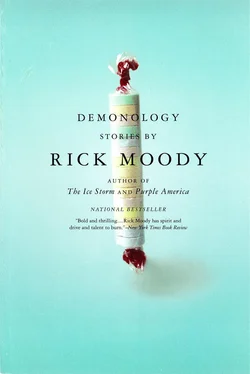Sis, we really broke in. Glenda kept her office locked when she wasn’t in it. It was a matter of principle. I had to use my Discover card on the lock. I punished that credit card. But we got the tumblers to tumble, and once we were inside, we started poking around. First of all, Glenda Manzini was a tidy person, which I can admire from an organizational point of view, but it was almost like her office was empty. The pens and pencils were lined up. The in and out boxes were swept clean of any stray dust particle, any scrap of trash. There wasn’t a rogue paper clip behind the desk or in the bottom of her spotless wastebasket. She kept her rubber bands banded together with rubber bands. The files in her filing cabinets were orderly, subdivided to avoid bowing, the old faxes were photocopied so that they wouldn’t disintegrate. The photos on the walls (Mansion weddings past) were nondescript and pedestrian. There was nothing intimate about the decoration at all. I knew about most of this stuff from the moments when she ordered me into that cubicle to dress me down, but this was different. Now we were getting a sustained look at Glenda’s personal effects.
Linda took particular delight in Glenda’s cassette player (it was atop one of the black filing cabinets) — a cassette player that none of us had ever heard play not even once. Linda admired the selection of recordings there. A complete set of cut-out budget series: Greatest Hits of Baroque, Greatest Hits of Swing, Greatest Hits of Broadway, Greatest Hits of Disco and so forth. Just as she was about to pronounce Glenda a rank philistine where music was concerned, Linda located there, in a shattered case, a copy of Greatest Hits of the Blues.
We devoured the green M&Ms while we were busy with our reconnaissance. And I kept reminding Linda not to get any of the green dye on anything. I repeatedly checked surfaces for fingerprints. I even overturned Linda’s hands (it made me happy while doing it), to make sure they were free of emerald smudges. Because if Glenda found out we were in her office, we’d both be submitting applications at the Hot Bird of Troy. Nonetheless, Linda carelessly put down her handful of M&Ms, on top of a filing cabinet, to look over the track listings for Greatest Hits of the Blues. This budget anthology was released the year Linda was born, in 1974. Coincidentally, the year you too were born, Sis. I remember driving with you to the tunes of Lightnin’ Hopkins or Howlin’ Wolf. I remember your preference for the most bereaved of acoustic blues, the most ramshackle of musics. What better soundtrack for the Adirondacks? For our meandering drives in the mountains, into Corinth or around Lake Luzerne? What more lonesome sound for a state park the size of Rhode Island where wolves and bears still come to hunt? Linda cranked the greatest hits of heartbreak and we sat down on the carpeted floor to listen. I missed you.
I pulled open that bottom file drawer by chance. I wanted to rest my arm on something. There was a powerful allure in the moment. I wasn’t going to kiss Linda, and probably her desperate effort to find somebody to liberate her from her foreshortened economic prospects and her unpronounceable surname wouldn’t come to much, but she was a good friend. Maybe a better friend than I was admitting to myself. It was in this expansive mood that I opened the file drawer at the bottom of one stack (the J through P stack), otherwise empty, to find that it was full of a half-dozen, maybe even more, of those circular packages of birth-control pills, the color-coated pills, you know, those multihued pills and placebos that are a journey through the amorous calendars of women. All unused. Not a one of them even opened. Not a one of the white, yellow, brown or green pills liberated from its package.
— Must be chilly in Schenectady, Linda mumbled.
Was there another way to read the strange bottom drawer? Was there a way to look at it beyond or outside of my exhausting tendency to discover only facts that would prop up darker prognostications? The file drawer contained the pills, it contained a bottle of vodka, it contained a cache of family pictures and missives the likes of which were never displayed or mentioned or even alluded to by Glenda. Even I, for all my resentments, wasn’t up to reading the let ters. But what of these carefully arranged packages of photo snapshots of the Manzini family? (Glenda’s son from her first marriage, in his early teens, in a torn and grass-stained football uniform, and mother and second husband and son in front of some bleachers, et cetera.) Was the drawer really what it seemed to be, a repository for mementos of love that Glenda had now hidden away, secreted, shunted off into mini-storage? What was the lesson of those secrets? Merely that concealed behind rage (and behind grief) is the ambition to love?
— Somebody’s having an affair, Linda said. — The hubby is coming home late. He’s fabricating late evenings at the office. He’s taking some desktop meetings with his secretary. He’s leaving Glenda alone with the kids. Why else be so cold?
— Or Glenda’s carrying on, said I.
— Or she’s polygamous, Linda said, — and this is a completely separate family she’s keeping across town somewhere without telling anyone.
— Or this is the boy she gave up for adoption and this is the record of her meeting with his folks. And she never told Dave about it.
— Whichever it is, Linda said, — it’s bad.
We turned our attention to the vodka. Sis, I know I’ve said that I don’t touch the stuff anymore — because of your example — but Linda egged me on. We were listening to music of the delta, to its simple unadorned grief, and I felt that Muddy Waters’s loss was my kind of loss, the kind you don’t shake easily, the kind that comes back like a seasonal flu, and soon we were passing the bottle of vodka back and forth. Beautiful, sad Glenda Manzini understood the blues and I understood the blues and you understood them and Linda understood them and maybe everybody understood them — in spite of what ethno-musicologists sometimes tell us about the cultural singularity of that music. Linda started to dance a little, there in Glenda Manzini’s office, swiveling absently her arms like asps, snaking to and fro, her wrists adorned in black bangles. Linda had a spell on her, in Glenda’s anaerobic and cryogenically frigid office. Linda plucked off her beige pumps and circled around Glenda’s desk, as if casting out its manifold demons. I couldn’t take my eyes off of her. She forgot who I was and drifted with the lamentations of Robert Johnson (hellhound on his trail), and I could have followed her there, where she cast off Long Island and Skidmore and became a naiad, a true resident of the Mansion on the Hill, that paradise, but when the song was over the eeriness of our communion was suddenly alarming. I was sneaking around my boss’s office. I was drinking her vodka. All at once it was time to go home.
We began straightening everything we had moved — we were really responsible about it — and Linda had gathered up the dozen or so green M&Ms she’d left on the filing cabinet — excepting the one she inadvertently fired out the back end of her fist, which skittered from a three-drawer file down a whole step to the surface of a two-drawer stack, before hopping and skipping over a cassette box, before free-falling behind the cabinets, where it came to rest, at last, six inches from the northeast corner of the office, beside a small coffee-stained patch of wall-to-wall. I returned the vodka to its drawer of shame, I tidied up the stacks of Brides magazines, I locked Glenda’s office door and I went back to being the employee of the month. (My framed pic ture hung over the water fountain between the rest rooms. I wore a bow tie. I smiled broadly and my teeth looked straight and my hair was combed. I couldn’t be stopped.)
Читать дальше












